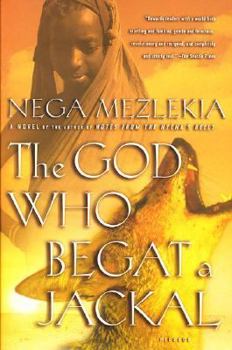The God Who Begat a Jackal
Select Format
Select Condition 
Book Overview
From the author of the hugely acclaimed memoir Notes from the Hyena's Belly comes a first novel steeped in African folklore and teeming with the class, ethnic, and religious struggles of pre-colonial... This description may be from another edition of this product.
Format:Paperback
Language:English
ISBN:0312309961
ISBN13:9780312309961
Release Date:January 2003
Publisher:Picador USA
Length:256 Pages
Weight:0.56 lbs.
Dimensions:0.7" x 5.5" x 8.0"
Customer Reviews
2 ratings
Wit, colourful images and social commentary - A beautiful novel
Published by Thriftbooks.com User , 18 years ago
Aster and her doting, desperate and despotic father. Gudu, born a slave and growing into a talented master-poet in the courts of Count Ashenafi; to a young man in love, risking great danger of detection; to a rebel-leader, finding himself in the fore-front of a people's struggle not just with war and survival, but also with social status, religion and superstition. The abettors, ancient war patriarchs, who live for the whiff of battle and consider it a shame to leave any side floundering in a conflict. Nega Mzelekia paints a surreal yet vivid landscape, laced with East African folklore and brimming with wit and humour. A beautiful novel. I had to read it twice, chuckling silently to myself every other line.
The God Who Begat a Jackal: Some Comments
Published by Thriftbooks.com User , 21 years ago
This is a well-written story set in the vicinity of the Ethiopian town of Harer in the years 1750-1800, according to the author's postscript. It tells of a love-affair destined for failure due to reasons of differing social status. As a backdrop, there are currents of class and religious struggles.The problem is that the religious struggle is between Amma and Mawu-Lisa, which were, according to the postscript, indigenous African religions. Perhaps indigenous African, but not indigenous Ethiopian. In being more universally African, the novel loses what is uniquely Ethiopian. At the time the story takes place, historical Harer is an Islamic stronghold in a Christian empire. Christianity is part of the country's soul. But, there is no mention of Islam or Christianity in the book. Instead, there are people passing through walls or taking to the air, powered by African magic.Thankfully, the author cannot completely escape his Ethiopian roots. Even in this alternate reality some things ring true to life in (the real) Ethiopia, such as the pervasiveness of a religion, the different societal expectation of men and women, and some of the peoples' social customs.





